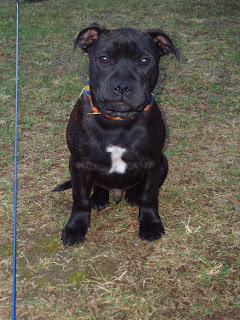Draft Code for the Welfare of Dogs
Did you know that there is a new code of welfare drafted recently covering the minimum requirements for a dogs well being?
You can have a copy of it e-mailed to you from:
animalwelfare@maf.govt.nz
It looks like a fairly sensible document, although the Boss had a couple of things to say about it. You have until the end of October to make any comments or submissions to the authors...so not very long.
This is a copy of what the Boss had to say to them...
Comments on
PUBLIC DRAFT Animal Welfare (Dogs) Code of Welfare
17 September 2007
Please find my submissions interspersed through quoted text.
Pg 14
3.1
… Recommended Best Practice
(a) Before acquiring a dog, intending dog owners should seek independent advice from experts (such as breeders,…)
Breeders cannot be counted upon as entirely independent or impartial, they have a financial interest in you taking the dog. Obviously some breeders are far more reputable than others, and I believe that this is another area that requires close scrutiny and guidelines.
Pg 20
5.1
…
General Information
Tethering can contribute to aggression. Ensure that tethers are long enough to allow dogs to reach the ground in the event that they climb over fences or other objects to which they are tied and risk hanging themselves.
How aggressive will it be after jumping such a fence…stuck on a severely restricted tether on
the wrong side of a boundary? If a dog is to be tethered near a fence (that has public access on the other side), then not being able to get to a (scalable height) fence should perhaps be
a minimum requirement? Even the best natured dog would be unstable in such a
predicament.
Pg 39
8.12. 3
…
General Information
Tail injury in many breeds has traditionally been prevented by tail docking according to breed
standards and practical requirements. Tails can be injured in the home and while dogs are
working. Tail injury can be painful and debilitating and will necessarily resolve itself
Pardon? Is that a typo?
Pg 40
9 Behaviour.
…
Recommended Best Practice
(a) Dogs should be appropriately trained and managed so that they can be kept under safe
control by their owners or carers.
(b) Puppies should be properly socialised to minimise the development of behavioural
problems. Care should be taken to ensure that socialisation is appropriate to the circumstances in which the individual dog will be kept as an adult (eg dogs likely to come into contact with livestock should be socialised accordingly).
…
(d) Dogs should be trained or taken to reputable training classes from the age of 16 weeks to
encourage them to learn basic commands.
Along with poor understanding of dogs behavioural traits, (particularly among younger children) a lack of socialisation and training is the underlying cause in many, if not most of the dog bite statistics we gather in New Zealand.
These instances, by their (graphically portrayed) nature, negatively impact on the welfare and freedoms of all dogs in our community. It puts at risk the ability to vigorously exercise dogs in open areas, as councils are pressured into bylaws restricting dogs from beaches and parks. It puts at risk the foundation on which companion dogs are regarded in society, that as “(Wo)mans best friend”
Our laws clearly state that it is an offence to own any dog that is aggressive or out of control, as an obvious protection to society. Yet we have no requirement that compels owners to train such behaviour out of their dog from day one, which is an obvious protection for the animal.
As mentioned earlier in the proposed Code, taking a puppy is taking a responsibility for the well being of the animal throughout its life. A dog that is unsure of its self and what is expected of it is at far greater risk of road injury, aggression from other dogs, and a myriad of environmental threats. Any owner of such a dog has reneged on their commitment to raise the dog in a responsible manner.
As such, these ‘best practice’ points, in particular ‘a’ and ‘b’, ought to be a Minimum Requirement. Failure to comply with any of these is detrimental to not only the individual dogs wellbeing, but also the place of all dogs in society. Schemes such as the NZKC Canine Good Citizen could quickly be adopted as a required standard, with emphasis placed firmly on rewarding owners through allowing approved animals to areas otherwise off limits, reduced licensing costs etc. (positive reinforcement for training the owners!)
The training costs involved for the owners are very modest, requiring time and commitment more than money. This is time that prospective dog owners have implicitly agreed to spend already. Councils would benefit by having Kennel Club accredited assessors actively testing all young dogs in the community at little extra cost to the public purse. Very much a user pays system. I imagine this would lead quickly to a huge saving in the real social cost of problem dogs.
Personally, I believe we should go further still, and insist that prospective owners get at least one WoF check on their property and ability to provide the stability and training any dog requires. A further temperament and training progress test at 8 – 12 months would also quickly identify potentially inappropriate handlers or dogs before they became a significant risk to either themselves or society.
Regards
Warren Bradley
Lake Hawea

No comments:
Post a Comment